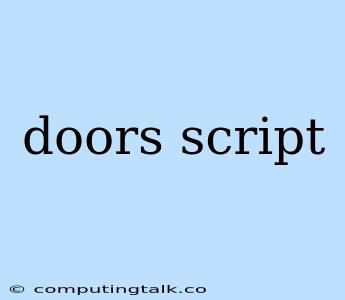Doors are an integral part of any building, providing security, privacy, and access control. They are often automated to enhance convenience and efficiency. In the world of scripting, doors script plays a crucial role in controlling and managing door operations. This article explores the various aspects of doors script and its applications in different scenarios.
What is a Doors Script?
A doors script is a set of instructions written in a programming language that defines the behavior of doors. It can be used to automate tasks such as opening, closing, locking, and unlocking doors. Doors script can be implemented in various systems, including home automation, building management, and security systems.
Applications of Doors Script
Doors script has numerous applications, including:
- Home Automation: Doors script can be used to automate doors in smart homes. For example, a doors script can be configured to automatically unlock the front door when a resident arrives home using their smartphone.
- Building Management: In commercial buildings, doors script can be used to manage access control, fire safety, and energy efficiency. For instance, doors script can be programmed to automatically lock doors during non-business hours or to open fire escape doors in case of an emergency.
- Security Systems: Doors script plays a vital role in security systems. It can be used to monitor door activity, trigger alarms in case of unauthorized access, and control the locking mechanisms.
- Industrial Automation: Doors script can be used in industrial settings to automate doors in manufacturing plants, warehouses, and other facilities. This can improve efficiency, reduce downtime, and enhance safety.
Types of Doors Script
Doors script can be classified into different types based on their functionality and programming languages:
- Basic Scripting: Basic scripting involves using simple commands to control door operations. For example, a script might contain instructions to open a door at a specific time or close it when a certain condition is met.
- Advanced Scripting: Advanced scripting utilizes complex logic and programming languages to control doors. These scripts can integrate with other systems, respond to external triggers, and perform sophisticated tasks.
- Cloud-Based Scripting: Cloud-based scripting allows users to control and manage doors remotely using cloud platforms. This enables users to monitor door activity, adjust settings, and troubleshoot problems from anywhere with an internet connection.
Creating a Doors Script
Creating a doors script requires an understanding of programming principles and the specific requirements of the door system. The following steps outline a general process:
- Define the Goals: Determine the specific tasks the script should accomplish.
- Choose a Programming Language: Select a programming language compatible with the door system.
- Write the Code: Develop the code to execute the defined tasks.
- Test and Debug: Thoroughly test the script to ensure it functions correctly.
- Deploy the Script: Install the script on the door system.
Tips for Using Doors Script
- Keep it Simple: Start with basic scripts and gradually increase complexity as needed.
- Use Comments: Add comments to the code to explain the functionality of each line.
- Test Thoroughly: Test the script under various conditions to ensure it works as expected.
- Document Your Code: Create clear documentation of the script's features, installation instructions, and troubleshooting tips.
Examples of Doors Script
Here are some examples of doors script that can be used in different applications:
- Automatic Door Opener: This script can be used to open a door automatically when a person approaches it. The script can use sensors to detect movement or facial recognition to identify authorized users.
- Door Locking System: This script can be used to lock and unlock a door remotely. The script can integrate with a smartphone app or a web interface to provide remote access control.
- Fire Safety System: This script can be used to automatically open fire escape doors in case of an emergency. The script can be triggered by smoke detectors, fire alarms, or other emergency sensors.
Conclusion
Doors script offers a powerful way to automate door operations and enhance convenience, efficiency, and security. By understanding the fundamentals of doors script, developers can create custom solutions tailored to specific needs. Whether it's for home automation, building management, or security systems, doors script plays a crucial role in modern door control and management.
